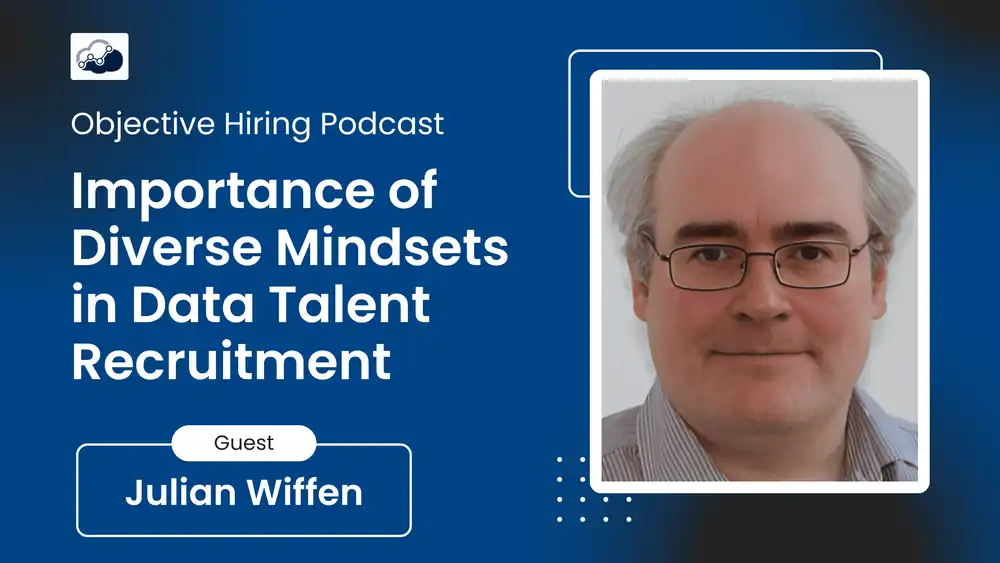Julian Wiffen on Why Mindset Diversity is Critical for Data Teams

Hiring for data roles isn’t just about technical capability. In the latest episode of the Objective Hiring podcast, Tim Freestone, founder of Alooba, speaks with Julian Wiffen, Chief of AI & Data Science at Matillion, about why the real hiring edge comes from embracing mindset diversity.
"The biggest challenge is related to diversity—but not in the traditional sense. It’s about getting diversity of mindset, and that tends to come from diversity of experience."
What is mindset diversity, and why does it matter?
Julian explains that traditional notions of diversity—important as they are—can still fall short if everyone is trained to solve problems in the same way. Particularly in data teams, where decisions can drive long-term strategy or AI model behaviour, homogeneity of thought can lead to costly mistakes.
"An organisation with a diverse mindset might move slower and argue more, but it’s less likely to move in the wrong direction."
This kind of diversity is harder to measure on a CV. It’s often found in people who took non-linear paths: those who switched careers, studied via Open University, or juggled work while self-learning analytics on the side. Julian argues these candidates often bring the unexpected value of fresh thinking.
Opening more doors: apprenticeships, internal moves, and squiggly careers
Matillion’s approach has been to actively broaden the entry points into their data team. Traditional graduate pathways still have their place, but Julian is also a strong advocate for apprenticeships and lateral internal hires.
"One of my team came from a fashion background. She was the one building the spreadsheets and reports—and that’s what she enjoyed. That became the start of her shift into data."
He shares that internal staff in ‘shadow analytics’ roles—such as admin staff who manage reporting or act as superusers in tools like Salesforce—can be hidden gems. With the right training, they can transition into formal data roles, often bringing valuable domain context.
"They might already be the go-to person for troubleshooting systems internally. Why not make that their full-time role?"
The risks of overvaluing pedigree
It’s easy to default to hiring based on past titles or academic prestige, but Julian warns that this misses a key piece: potential.
"Just because someone’s not doing well in their current team doesn’t mean they won’t thrive in a different one."
He shares examples of lateral hires who weren’t previously seen as top performers—yet excelled when given a different scope, environment, or level of support.
"You give them a bit of love and attention, and they become your most productive, loyal team members."
This mindset requires companies to shift from filtering out based on minor gaps to leaning into learning potential—and giving people the space to grow.
Organisational barriers to tapping internal talent
Why don’t more companies invest in internal mobility? Julian points to several barriers, including fear of being perceived as disloyal when expressing interest in a different team, and managers reluctant to lose top performers.
"There’s a fear that saying you’re interested in another role makes you look like you’re quitting. That’s a cultural issue."
"Losing someone could be seen as a chance to grow someone else—shuffle the work, give others a stretch opportunity."
These are cultural and leadership challenges—not process ones. Julian argues that fixing them is critical not only to retention but also morale.
The business case: more learning-focused, adaptable hires
One of the biggest advantages of hiring for mindset over credentials is adaptability. In fast-changing fields like data and AI, today's skills are quickly outdated.
"What I want to see is self-driven learning. Did they take the initiative to explore something outside their course or job?"
"That’s the person who will still be useful when the next new technology comes along."
Julian suggests simple ways to screen for this: asking what parts of a course excited them, whether they pursued anything further, and even giving candidates a problem in a language they’ve never seen before to see how they react.
Final thoughts
Mindset diversity isn’t about lowering the bar—it’s about raising the ceiling on what a team can collectively achieve. Julian’s approach pushes hiring managers to rethink talent signals and build teams that are not only capable today, but ready for tomorrow.
If you’re looking to uncover hidden potential in your own hiring process, especially in data roles, Alooba can help you evaluate candidates based on real skills and learning ability—not just their CV. Sign up here to start hiring more objectively.